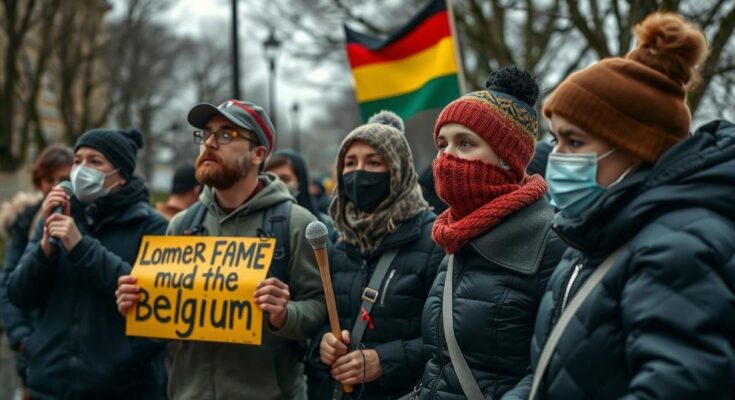Freedom for Eurasia urges Belgium to reconsider the deportation of Sitoramo Ibrohimova and her four children due to potential persecution in Tajikistan. Activists claim her extradition could lead to serious human rights violations, citing fabricated terrorism charges. This incident reflects broader issues facing Tajik refugees in Europe, where deportations often ignore the risk of severe consequences upon return.
In a collective cry for justice, human rights advocates are drawing attention to the case of Sitoramo Ibrohimova, a 37-year-old Tajik mother, currently confined within the cold, stark walls of a Belgian detention center, facing deportation with her four young children. Activists from Freedom for Eurasia argue that should she be sent back to Tajikistan, she would confront grave dangers including severe persecution for alleged ties to ISIS and the Syrian conflict, risks exacerbated by a troubling list that brands her as an extremist. Sitoramo’s plight is linked intricately with her husband, Murodali Halimov, a man now serving a daunting 23-year sentence for terrorism. Leyla Nazgul Seyitbek, the head of Freedom for Eurasia, shared with Radio Ozodi heart-wrenching news of Ibrohimova’s deteriorating mental health, revealing, “She is depressed, and her 12-year-old son has stopped speaking due to stress.” This family is being torn apart by political circumstances that have led to the deportation of close relatives, like Ibrohimova’s sister, Nigora, who also suffered the harsh repercussions of a regime that vilifies dissenters. The harsh reality for Tajik political refugees in Europe is underscored by the alarming trend of rapid deportations, often taking place without fully addressing the individual safety concerns of those being returned. For instance, as highlighted by media reports, many such individuals face an ominous future upon arrival in Tajikistan, where political imprisonment and accusations of terrorism could await them. The plight of Dilmurod Ergashev, another Tajik opposition figure now detained in Germany, reflects a greater systemic issue affecting many Iranians fleeing oppression. Since the dissolution of the Islamic Renaissance Party of Tajikistan in 2015, opposition members have desperately sought refuge in Europe, only to find themselves ensnared in a web of bureaucratic indifference. While European authorities may act with urgency, it is crucial to remember the human lives behind each deportation decision. Activists like Seyitbek raise alarms over the systemic failures within the EU immigration process, insisting that Ibrohimova’s terrorism charges are fabrications in a deeply flawed justice system. This dire circumstance is echoed in the sobering stories of other deported Tajik refugees such as Abdullo Shamsiddin, sentenced to seven years for political dissent, and Bilol Kurbonaliev, who is purged into a ten-year sentence. Their harrowing experiences underscore the urgent need for systemic reform within Europe’s asylum policies, which too often result in sending vulnerable individuals back to face persecution.
Human rights activists have increasingly raised alarms over the deportations of Tajik citizens, particularly those with perceived political affiliations or family ties to accused individuals. The backdrop is a repressive political environment in Tajikistan, where dissent against the government is met with severe punishment. Activists argue that the European Union’s response to requests for asylum is often inadequate, leading to the potential risk of torture and long imprisonments for deported individuals. In recent years, Tajikistan has aggressively pursued individuals it claims are affiliated with terrorist activities, many of whom are actually political dissidents fleeing government repression.
The case of Sitoramo Ibrohimova brings to light the harrowing reality faced by Tajik refugees in Europe, where bureaucratic policies often prioritize expedience over safety. This incident not only raises questions about the legality of the deportation process but also humanizes the plight of families caught in the crossfire of political strife. As global advocates continue to battle for the rights of Ibrohimova and her children, the need for a reevaluation of the EU’s treatment of asylum seekers becomes increasingly pressing.
Original Source: timesca.com



